
A woman’s right to make informed decisions about her own health is critical. Empowering women with knowledge, and involving them in decision-making processes, are essential steps towards ensuring safer childbirth.
As part of our work to understand and share women’s stories, we spoke to Helena about her experience of managing maternal anaemia and postpartum haemorrhage (PPH).
“If you develop a health condition [anaemia] that could affect your outcomes, then you should be apprised of exactly what that might mean.”
Helena’s pregnancy was complicated by maternal anaemia, a condition that often slips under the radar in prenatal care, particularly in low- and middle-income countries where haemoglobin tests are not offered or are not affordable for many women. Throughout her pregnancy, Helena experienced symptoms of fatigue and weakness, signs that her body was struggling to maintain adequate iron levels.
Although Helena’s anaemia was detected and she was given iron tablets, she was unable to take these tablets as they exacerbated her IBS. She communicated this with her care team, however, she was not told about the urgency of treating anaemia during pregnancy, and the increased risk it posed. She was not offered intravenous iron injections to replace the tablets she could not take, and so her maternal anaemia was left untreated.
“They made it feel like it was all very routine, the anaemia, that it just wasn’t a big deal”.
Helena’s experience echoes that of countless women. We know from the WOMAN-2 Trial that women with anaemia are substantially more likely to suffer life-threatening bleeding after childbirth, however, many women are still unaware of the danger posed by maternal anaemia. Had Helena been informed, she would have been better equipped to advocate for her own health.
“Ultimately, if you feel that your baby’s life might be at risk, you’re just going to do what you’re told by someone who you assume knows a lot more than you do.”
Before her due date, Helena had put together a birth plan outlining her preferences for pain management and postpartum care. However, Helena was denied pain relief during labour, despite asking for it on two separate occasions. Additionally, the interventions she had hoped to avoid, such as the use of a ventouse, were administered without proper consultation, leading to a cascade of events that put her in extreme distress and her health at further risk. This disregard for her wishes left her feeling disempowered and vulnerable during a moment that should have been characterised by support and informed decision-making.
“No one was talking to me at any point. No one told me anything.”
The lack of communication persisted even after childbirth. Helena was unaware that she had experienced a postpartum haemorrhage (PPH) until long after the event had passed. Although she remembers seeing someone walk away with a huge wad of blood-soaked material, it was not until the following morning that a different obstetrician informed her that she had lost 1.5 times as much blood as the top estimate for safe blood loss.
“I think that you should give women as much information as possible.”
In addition to finding out about her PPH, Helena also discovered that no treatments for PPH were administered. The WOMAN Trial found that tranexamic acid – an inexpensive and widely available drug – could save the lives of mothers who would otherwise bleed to death after childbirth. In the trial, death due to bleeding was reduced by about a third if the treatment was given within three hours. Helena’s story highlights the urgent need to ensure that women are not only aware of lifesaving drugs but feel empowered to request them as part of their birth plans.
“I think you’re within your rights to ask for what you want.”
Reflecting on her birth experience, Helena stresses the need to improve understanding and support around maternal anaemia – including regular blood tests. By advocating for greater attention to maternal health needs, we can strive to improve outcomes for mothers like Helena, ensuring that they receive the support and resources necessary for a healthy pregnancy and postpartum period.